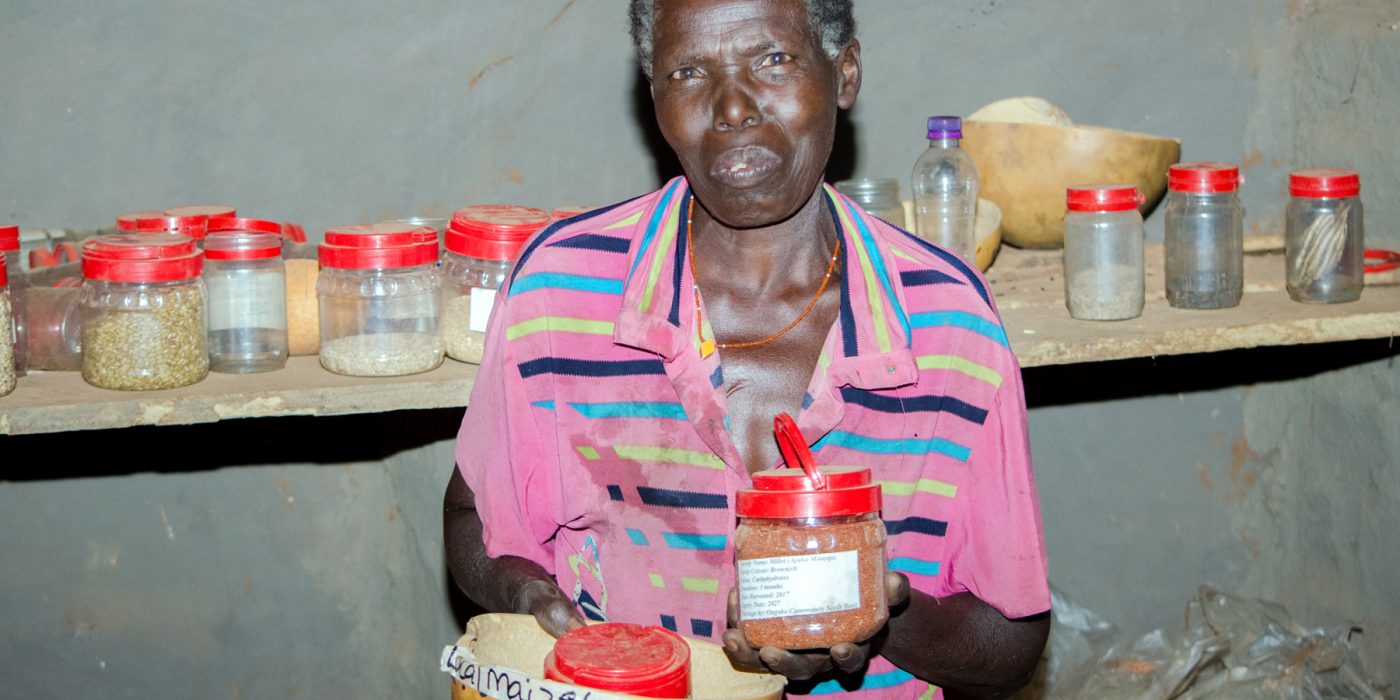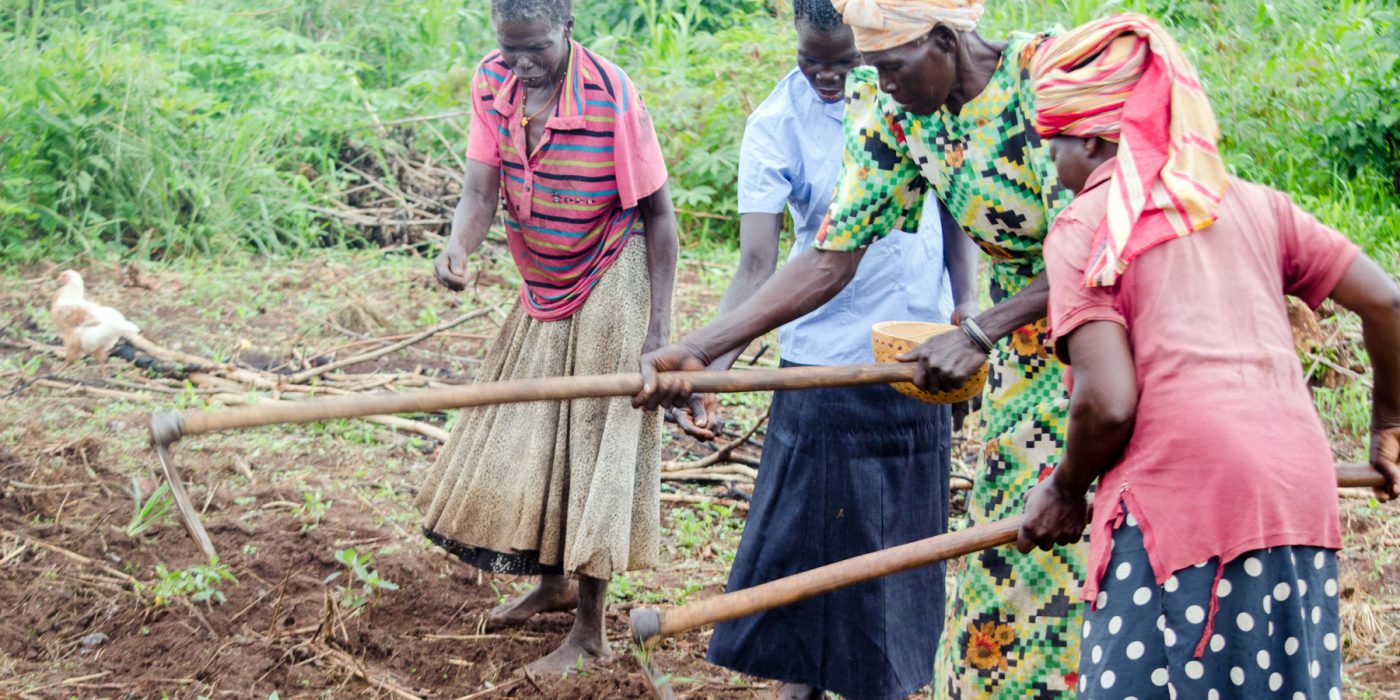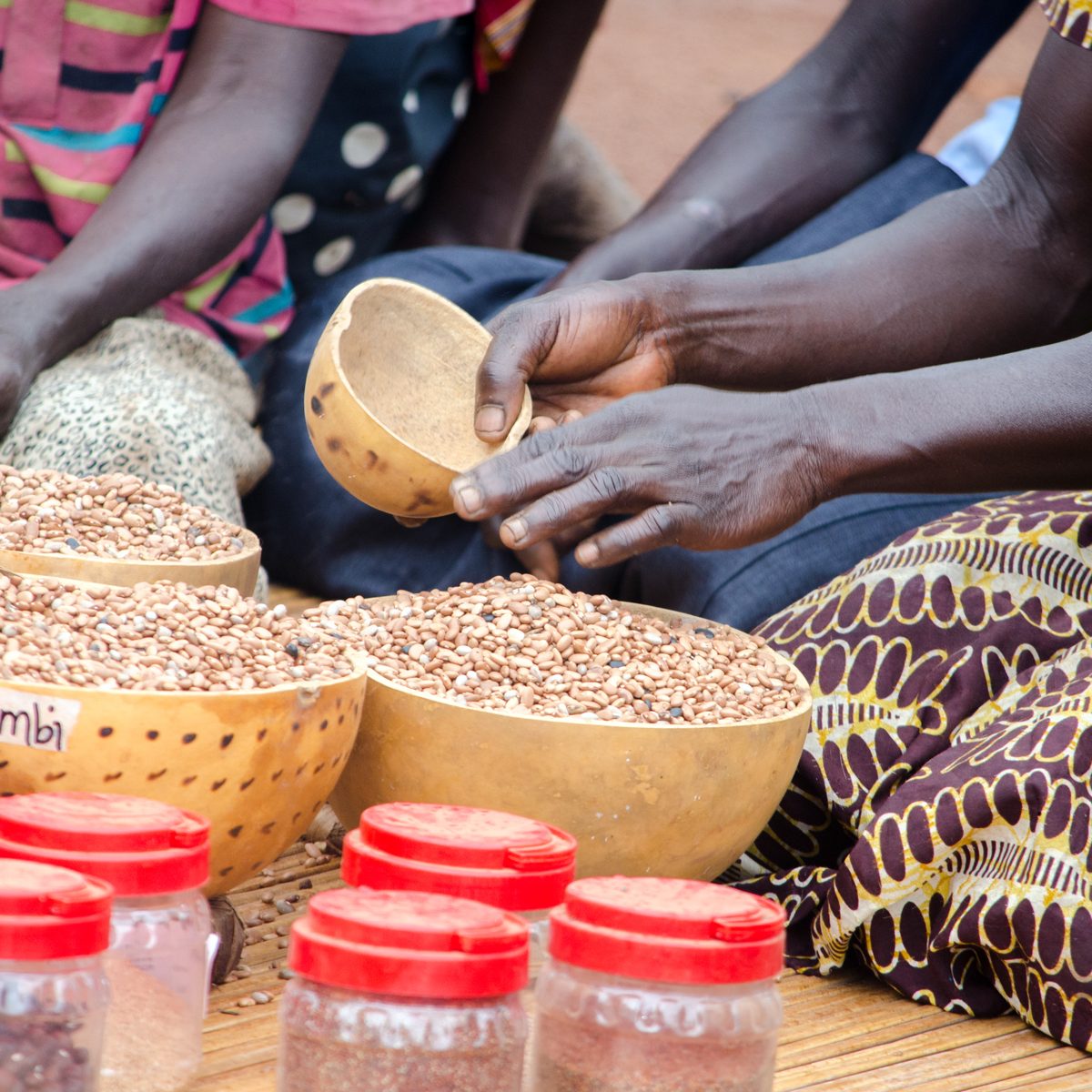SUMMARY
Small-scale farmers, particularly women, face challenges that affect their seed sovereignty such as lack of access to quality seed, the influx of fake seeds in the markets, and increasing pressure from multinational corporations. With all these challenges it is difficult to increase production and productivity to achieve food security and sovereignty. ESAFF Uganda used a community-led seed security model in one district of Northern Uganda to ensure that small scale farmers can access quality seed and have the power and right to save, use, exchange and sell seeds.
THE PROBLEM
Food insecurity remains high in Uganda. Access to food is affected by poverty, price instability, poor road infrastructure and imperfect market conditions. Consequently 22% of households in Uganda consume only one meal per day. Low productivity reduces food production, thus reducing food availability. The lack of critical factors of production such as land, seeds, and extension services has left many small-scale farmers, especially women in Northern Uganda, unable to increase their production and productivity. Moreover the armed conflict perpetrated by the Lord’s Resistance Army (LRA) kept most farmers in Internally Displaced People’s Camps for a long time.
Seed is an instrumental input that determines the development of agriculture and women small-scale farmers are the primary seed custodians, playing a crucial role in maintaining agricultural biodiversity and ensuring food and nutrition security for their communities. However, over time the farmers’ self-reliance to provide their own seed and other planting material is continually being undermined. Stressed ecological support systems and climate variability combine with man-made effects like the influx of fake seeds in the market, high costs, lack of adequate extension services, increasing pressure from multinational corporations, and poor implementation of existing laws and policies.
However, even with these uncertainties, an estimated 80% of the country’s seeds come from farmer managed seed systems which have been consistent over years. ESAFF Uganda saw the need to empower such a system and strengthen farmers rights to save, use, exchange and sell seed in the face of increasing pressure from multinational corporations, researchers and private sector actors to secure intellectual property rights to these seeds.


THE SOLUTION
To address the current seed security and sovereignty challenges in the northern region, ESAFF Uganda used the community managed seed security model (CMSS). This consolidates the existing good seed security practices scattered among small scale farmers into a comprehensive approach for promoting community seed security. Under this model, farmers are taken through eight modules where they gain knowledge on seed rights.
The objective of this intervention was to contribute to improving agricultural productivity and seed sovereignty of small-scale farmers through increased access to affordable, good quality seeds of their choice at all times.
The intervention applied a practical, harmonised and systematic approach for promoting community-led seed security for small scale farmers as well as consolidating the technical capacity of small-scale farmers to identify, multiply, save and distribute good quality seed for improved food security.
The project was implemented by Eastern and Southern Africa Small Scale Farmers Forum (ESAFF) Uganda with financial support from Oxfam in Uganda. The project targeted small scale farmers, especially women, in Gulu District, Uganda, with ten farmer groups and 3,250 farmers in four sub-counties, i.e. Ongako, Laroo, Bungatira and Unyama.
The intervention involved the following process:
Introduction and brainstorming: Small-scale farmers were taken through understanding seed security issues such as seed related challenges, existing seed security interventions and the gaps therein which justified the need for the intervention using the CMSS Model.
Planning and management: Six local seed security committees were established to spearhead the implementation and monitoring activities involved in the process. Members of these committees gained an understanding of how to carry out a cost-benefit analysis and develop seed distribution guidelines.
Training: Small-scale farmer group members were trained in seed production and management practices i.e. understanding seed and seed security, seed identification and selection, field management of a seed crop, soil fertility management in seed production and pre- and post-harvest seed handling.
Quality control: Seed security committees were tasked with developing quality control guidelines in consultation with farmer group members and other stakeholders, researchers and facilitators. Facilities for ensuring seed quality were established, i.e. simple seed processing facilities such as shelling equipment, materials for drying seed materials (polythene, tarpaulins or raised stands) and seed storage facilities.
Collecting or procurement: Small-scale farmers selected the seed of their interest and were equipped with necessary skills in seed multiplication and management. The next step was collecting or procurement of foundation seed for multiplication from reliable and trusted sources.
Seed multiplication: This important aspects of the intervention involved site selection, the establishment of a multiplication garden, and recommendation of best agronomic practices as well as carrying out periodic monitoring and field inspection. Small-scale farmers were introduced to climate resilient agroecological techniques that were used to reduce or eliminate the effects of climate change during the process. Small-scale farmers used techniques like drip irrigation and conservation farming practices that ensure the preservation of ecosystems.
Seed distribution and marketing: Small-scale farmers took the decisions to sell the seed to other group members at low prices, give out seeds as loans, or share freely with other small-scale farmers.
Evaluation and scale out: This involved reviewing performance of the intervention, documentation and sharing of best practices with other small-scale farmers, stakeholders and partners to improve future implementation. This was done through seed dialogues, local seed fair, experience sharing among farmers, organising learning visits etc.
RESULTS
Strengthened solidarity: Small-scale farmers understood the relevance of protecting and preserving their indigenous seed systems and shared the knowledge, contributing to the preservation of crop diversity.
Increased seed security: Small scale farmers developed ten community seed banks for their local seed varieties in three sub-counties of Unyama, Ongako and laroo in Gulu district. In the seed banks, farmers have managed to collect over 50 different varieties of seeds, including beans (nabale, kanyebwa, black beans), okra, cassava stems, soya beans, pigeon peas, groundnuts, millet, sorghum, lapena, boo, and marakwnag among others.
Increased incomes: Farmers gained an alternative source of income from selling seeds to other farmers in their communities and at market, improving household livelihoods.
Increased political support for farmer managed seed systems: Local leaders have gained awareness on farmers’ needs to access quality seed and presented farmers’ challenges to national leaders.
Strengthened social capital: Small-scale farmers have been able to build relationships through working together, improving teamwork in advocacy around seeds both at the local and national level.


challenges
- Poor documentation of local practices and knowledge which made it difficult to convince some groups of people like researchers and government officials on the role farmer managed seed can play in securing food security.
- Many farmers have been brainwashed by the ‘improved varieties’ on the market, thus making it difficult to grow their local indigenous seed varieties.
- Lack of consideration of farmer-led research by the
Success factors
- Commitment of the small-scale farmers, especially women, to engage in the process, working together as a group.
- Willingness of the different stakeholders including local leaders and officials who arranged field visits and encouraged farmers to continue believing in their local seed varieties.
- Experience from already practising farmers were also a great driver for farmers to try it out.
CONCLUSIONS
The seed is an essential element in crop production, representing a valuable resource that is paramount in sustaining the supply of food. It is also an important aspect of enhancing rural development and poverty reduction. Therefore it is crucial that farmer managed seed systems should be recognised, supported and promoted by developing and implementing tailored and appropriate seed policies that guarantee the mandate of local seed systems. Farmer managed seed systems not only present opportunities to deliver seed, food and nutrition security, but also have the potential to provide solutions that are resilient to the changing climate.

WHAT MORE CAN BE DONE?
The process of farmer-led seed multiplication, storage (seed banking) and distribution system that enables the community to control their seed security system should be scaled up from the few sub-counties to cover the northern region of the country which has been most hit by the loss of biodiversity as a result of displacement of people.
There is a need to scale up the sharing of outcomes and experiences on farmer managed seed systems through video documentaries and developing Information Education and Communication materials to create awareness on the project.
WHO IS AFSA?
AFSA brings small-scale food producers, pastoralists, fisherfolk, indigenous peoples, farmers’ networks, faith groups, consumer associations, youth associations, civil societies and activists from across the continent of Africa to create a united and louder voice for food sovereignty.
For more information and more African case studies see our website https://afsafrica.org
AFSA encourages the use and reproduction of this case study for non-commercial use provided that appropriate acknowledgment of the source is given.

ACKNOWLEDGEMENTS
Author: Rashidah Namatovu, Programs Officer, Eastern and Southern Africa Small Scale Farmers Forum (ESAFF) Uganda
Email: rnamatovu@esaffuganda.org
Web: http://www.esaff.org




























